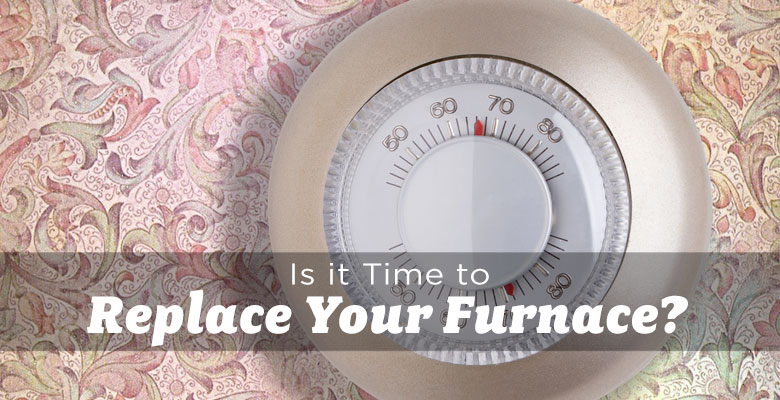
How Does a Furnace Work?
A basic gas furnace uses a series of individual components to control two airflows. Each is critical for delivering warm air into your home.- Airflow #1: A fan draws air into the burner where natural gas ignites to a continuous flame; like a propane grill. This flame heats the air inside a part called the heat exchanger. This metal enclosure gets really hot. The airflow from the fan carries this toxic carbon monoxide filled air out through a flue on top of your house.
- Airflow #2: A separate fan draws air from inside your home. The air passes over the outside of the heat exchanger, making it warm. It then continues through the ducts and back into your home before beginning the cycle again.
How Long Does a Furnace Last?
The average lifespan of a furnace is 15 to 20 years. A well-maintained furnace might go a bit longer, but other factors, including usage, influence results. It’s pretty hard to find seldom-used furnaces around here.Do You Need a New Furnace?
Only a qualified professional can tell you with certainty, but answer these questions:- Is your furnace less than 15 years old?
- Does it work?
- Has your furnace had annual professional maintenance?
- Has the filter been changed monthly?
- Is the furnace free from visible rust or corrosion?
- Does it run quietly?
- Have your heating costs stayed consistent with usage?
What’s a BTU?
If it’s time to retire your furnace, you might as well find ways to save some money with the new one. Making sure to select a unit that’s appropriate for your home is a good start. If you’ve looked around at all, you’ve probably seen the acronym BTU. A British Thermal Unit (BTU) is a unit of measure that, cumulatively, describes the amount of energy needed to heat something. One BTU is the amount of energy required to warm a pound of water by one degree Fahrenheit at sea level. Most furnaces rate between 40,000 and 130,000 BTUs, with an average home needing between 80,000 and 100,000. When it comes to heating your home, bigger isn’t necessarily better.How Many BTUs Do You Need?
Determining your BTU level is a little math-intensive. But for a ballpark range, you can multiply your home’s square footage by 40 or 45. There’s a wide margin of error here, so don’t use this method to make decisions. Selecting an oversized or undersized furnace is bad news. Your service provider should show you how they calculate your home’s BTU needs. Oversized furnaces:- Create uneven and excessive heating
- Do not perform to their rated efficiency
- Frequently cycle on and off, significantly reducing their lifespan
What’s AFUE?
Annual fuel utilization efficiency (AFUE) is a percentage that describes how frugal your furnace is. It tells you how much of the gas that you pay for ends up as heat in your home. Current furnaces fall into these categories:- Minimal efficiency: 78 per cent
- Mid-efficiency: 80-85 per cent
- High-efficiency: 90-97 per cent
How to Increase The Lifespan of Your Furnace
By selecting an appropriate-size furnace with improved efficiency, you’ll reduce your heating costs. Over time, those savings can cover a sizeable portion of your purchase price. Now the goal is to get your new unit to last as long as possible. Follow these tips to maximize the life of your furnace:- Take steps to improve your home’s energy efficiency. Better insulation and seals reduce the demand on your furnace.
- Choose a reputable furnace installation company in Edmonton to help select and then install your unit. Improper installation impacts your furnace’s efficiency and contributes to a shorter lifespan.
- Change filters monthly. Clogged filters are a factor in many costly furnace repairs.
- Periodically inspect your furnace for visual signs of trouble including puddling water and corrosion.
- Take note of noticeable changes in fuel costs and discuss them with a technician.
- Schedule an annual cleaning and inspection. It’s best to do this just before the cold season begins.

1 Response to Should you Replace your Ageing Furnace?
We moved into this house about a decade ago and of course the furnace was already there when we moved in. We did need to have it repaired last year and everything is working fine now, although it is sometimes too noisy. This post was an eye opener, thank you for sharing. Is there a particular furnace brand that you would recommend?
Posted by Emma Metson on Wednesday, August 8th, 2018 at 6:07amLeave A Comment